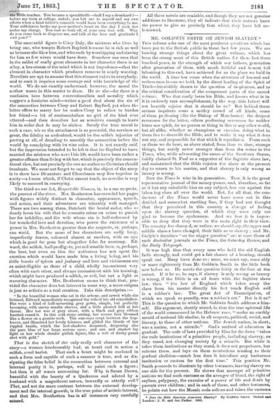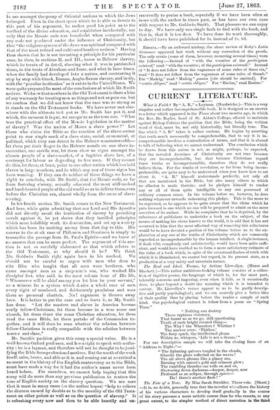MR. GOLD WIN SMITH ON JEWISH SLAVERY.*
THIS volume asks one of the most pertinent questions which has been put to the British public in these last few years. We are healing strange things about the great volume, which has been the strong meat of this British nation for tlies last three hundred years, in the strength of which our fathers, generation after generation of them, with much faithful end honest toil labouring to this end, have achieved for us the place we hold its the world. A time has come when the attention of learned and serious men is—as we hold, by the direct leading of the Spirit of Truth—irresistibly drawn to the question of inspiration, and to the critical consideration of the component parts of the sacred volume. Who that really loves his Bible, and knows what is in it (a curiously rare accomplishment, by the way, this latter) will not heartily rejoice that it should be so ? But behind these serious inquirers come a motley crowd of all kinds, some of them professing (like the Bishop of Manchester) the deepest reverence for the letter, others professing reverence for neither letter nor spirit, for no person or thing in this or any other world, but all alike, whether as champions or encodes, doing what in them lies to discredit the Bible, and to make it say what it does not say, and responsible for that which it repudiates. From such its these we do hear, as above stated, from time to dine, strange things, but surely never stranger than from the writer in the Times, who, while advocating the cause of the Southern States, boldly claimed St. Paul as a supporter of the fugitive slave law, and maintained that the Bible enjoins the slave at the present day to return to his master, and that slavery is only wrong as luxury is wrong.
Now the Times is wise in its generation. Trim, it is the great representative journal of the money-power, and, therefore, so far as it haa any calculable bias on any subject, has one against the labou. iug class all over the world. But, for all that, the con- ductors of the Times would never have come out in this decided and somewhat startling line, if they had not thought that they perceived in this country a change of feelings upon the slavery question, of which they were only too glad to become the spokesmen. And we fear it is impos- sible to deny that they were in the main right in their view.. The country has chatigt.d, or rather, we should say, the upper and middle classes have changed, their faith as to slavery ; and Mr. Carlyle's doctrines "on the nigger question" are at once those of such dissimilar journals as the Times, the Saturday Review, and the Daily Telegraph.
It was high time that every man who held the old English faith strongly, and could get a fair chance of a hearing, should speak out. Many have done so ; none, we must say, inore ably or more righteously than Mr. Goldwin Smith in the little book now before us. He meets the question fairly in the face at the outset. If it be so, he says, if slavery is only wrong as luxury is wrong, if the Bible is on all fours with the fugitive slave law, then " the law of England which takes away the slave from his master directly his feet touch English soil is a robber's law. The great Act of Emancipation, of which we speak so proudly, was a robber's act." But is it so? This is the question to which Mr. Goldwin Smith addresses him- self. His argument, shortly stated, is, that the true spiritual life of the world commenced in the Hebrew race, "under an earthly mould of national life similar, in all respects, political, social, and literary, to those of other nations. The Jewish nation, in short, was a nation, not a miracle." God's method of education in. gradual. The code of laws provided by Him for the Jews •‘ takes- the rude institutions of a primitive people, including slavery, as they stand, not changing society by a miracle. But while it. takes these institutions as they stand, it does not perpetuate, but reforms them, and lays on them restrictions tending to their gradual abolition—much less does it introduce any barbarous institution or custom for the first time." This position Mr. Smith proceeds to illustrate by other instances, leaving slavery on one side for the present. He shows that amongst all primitive nations we find such customs as the avenger of blood, the right of asylum, polygamy, the exercise of a power of life and death by parents over children; and in each of these, and other instances, he points out how the Mosaic code softens and raises the customs.
* Does the Bible Sanction American Slavery? By Goldwiu Smith. Oxford sod London: J. H. and Jas. Parker. 18438. in use amongst the group of Oriental nations to which the Jews belonged. Even in the short space which he is able to devote to this part of his argument, he makes good his point as to the method of the divine education, and establishes incidentally, not only that the Mosaic code was beneficent when compared with any code not produced under the influence of Christianity, but that "the religious system of the Jews was spiritual compared with that of the most refined and cultivated heathen nations.'' Having thus shown that he is not inventing a principle for his particular case, he then, in sections II. and III., turns to Hebrew slavery, which be treats of in detail, showing what it was in patriarchal times, in the tents of Abraham and Isaac, and what in later times, when the family had developed into a nation, and contrasting it step by step with Greek, Roman, Anglo-Saxon slavery, and lastly, with the "peculiar institution" as it exists in the United States. We were quite prepared for most of the conclusions at which Mr. Smith arrives. We knew that nowhere in the Old Testament is there a hint of any warranty for treating men as things and not as persons, but we confess that we did not know that the case was so strong as it stands on the Old Testament books. We have never met else- where with the ultimate test put as Mr. Smith has put it, and which, the moment it is put, we recogn'ze as the true one. "What was the practical effect of the Mosaic legislation in the matter of slavery ? Was the nation of Moses a slave power ?" Let those who claim the Bible as the sanction of the slave-owner point to one single mark of a slave state, social, economical, or political, which they can detect in the Hebrew commonwealth— let them put their fiuger in the Hebrew annals on one slave in- surrection, one servile war, let them show us signs amongst the chosen people of a slave-market, of a fugitive slave law, of a contempt for labour as degrading to free men. If they cannot -do this, let them, at least, point to one other nation which has held slaves in large numbers, and in which any one of these signs has been wanting. If they can do neither of these things we have a right to conclude, with Mr. Smith, that the Mosaic code, so far -float fostering slavery, actually educated the most stiff-necked and hard-hearted people of the old world so as to deliver them, even before the Christian era, almost wholly from the curse of slave- wning.
In his fourth section Mr. Smith comes to the New Testament. And here, while quite admitting that our Lord and His Apostles did not directly assail the institution of slavery by preaching revolt against it, he yet shows that they instilled principles which must infallibly work its destruction, and set up a society which has been its untiring enemy from that day to this. His answer to the stock case of Philemon and Onesimus is simply to transcribe the passage from St. Paul's Epistle—and we know of ito answer that can be more perfect. The argument of this sec- tion is not so carefully elaborated as that which relates to the Old Testament, as why should it be ? We think Mr. Goldwin Smith right again here in his method. We -should not be careful to argue with men who dare to cite Him who taught that all men were brethren, who came amongst men as a carpenter's son, who washed His -disciples' feet, who said, in the most solemn hour of His life, 4' Whosoever will be chief among you let him be your servant," as a witness for a system which denies a whole race of men every right of manhood, and deliberately proclaims and uses them as personal chattels. No! argument is thrown away here. It is better to put the case and so leave it, as Mr. Smith has done. "Let the masters and slaves in America become really fellow-Christians, let them become in a true sense one church, let them share the same Christian education, let them read the same Bible, let them partake of the Communion to- gether, and it will then be seen whether the relation between fellow-Christians is really compatible with the relation between master and slave."
Mr. Smith's position gives this essay a special value. He is a well-known Oxford professor, and has a right to speak with autho- rity; he is a layman, and therefore will not be thought to be justi- fying the Bible from professional motives. But the worth of the work itself, calm, brave, and able as it is. and coming out at so critical a +moment in the history of the English controversy as to the Bible, must have made a way for it had the author's name never been heard before. For ourselves, we cannot help hoping that this essay will do more than any previous publication to restore the tone of English society on the slavery question. We are sure that it must in many cases (as the author hopes) "help to relieve the distress caused by doubts as to the morality of the Old Testa- ment on other points as well as on the question of slavery." It is refreshing every now and then 'to be able heartily and Un- reseriedly to praise a book, especially if we have been often at issue with the author in times past, as has been our own case with respect to Mr. Goldwin Smith. That pleasure we can enjoy to day. We have only one single fault to find with the book, and that is, that it is too dear. To have done its work thoroughly, it should have been published for Is. instead of 2s. (id.































 Previous page
Previous page